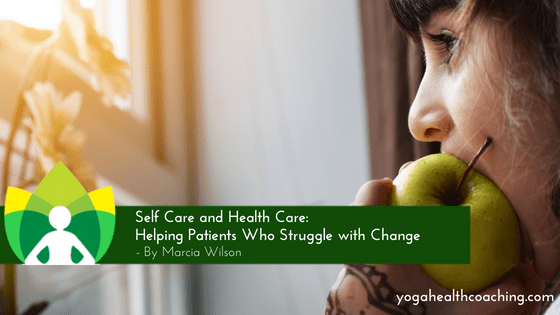
Self Care and Health Care: Helping Patients Who Struggle with Change
Exercise. Stress management. Getting enough sleep. Monitoring sugar and salt intake.
Every family physician, nurse practitioner and allied health professional knows the value of health habits and has recommended them to their patients. Referrals are made to dietitians who educate on diabetes and physiotherapists who design post-surgical treatment plans. We educate on the relationship between high blood pressure and exercise. We talk about stress and mental health. But more often than not our patients are left to navigate their self care planning on their own. Facing yet another flu season with a run down immune system or weight gain following a stressful work project, our patient’s attempts to make significant changes in lifestyle are often short-lived. At their next clinic appointment, we revisit the same health plan. And frustrated, we wonder why our patients don’t take responsibility for their own health.
So here’s the thing. One of my clients recently made it abundantly clear why she was having a hard time moving forward with changes in her habits. No matter what her doctor said – no matter how much she wanted to make the change – there were three things that were impacting her ability to shift.
One. She didn’t have the support she needed.
Two. She didn’t know what to do – the huge range of choices available to her was overwhelming.
And three. She didn’t know how to how to get started, how to sustain the behavior, and how to make sure that it was lasting change.
She just didn’t have the skills needed to create the new habits and behaviors that were going to help make the change she wanted.
Change in Health Habits = Change in Identity
I began my career working in the traditional medical system as an occupational therapist. A member of the rehabilitation team, my role was to help people with injuries, disease and illness be as functional as possible in the roles that they held in their life – as parents, employees, husbands, wives and community members. Much of my work was with people with multiple sclerosis. I worked in hospitals, outpatient clinics, community health centers, and in care facilities. And one of the things I learned is that it is really hard to help patients make changes in their daily habits.
Why? Because lifestyle change means taking on a new identity. Using a wheelchair instead of walking. Cutting back on work. Taking midday rests. For someone with multiple sclerosis these all signify a new way of being – often an identity shift that they do not want to take.
Similarly, changing health habits can mean a massive shift in identity. From a smoker to a walker, a daily drinker to a meditation fan, or a couch potato to a gym rat. Each of these changes ripples out to impact family, friends, children and coworkers. Social circles change. Friendships are lost and found. Simple things like shopping for groceries becomes complicated as stores that sell beer and wine are avoided and the bulk bags at Costco become taboo.
Making lifestyle changes means more than eating something different at dinner. It means a life overhaul that requires planning and support to make the new habits stick.
Changing Perspective- Coaching + Group Work
When I shifted away from working in a traditional medical system I was able to see a big gap that exists in the absence of a diagnosable condition like diabetes or heart disease. It can be hard to find organized support for broad lifestyle change. Weight loss and addictions programs serve a segment of the population, but for many of us there is a massive gap in access to simple and effective programs that teach us how to care for ourselves.
Through studies in yoga, I was introduced to the eastern health system of Ayurveda, and its teachings on healthy daily habits and routines. As someone who has always struggled with workaholic tendencies and inflammatory conditions like asthma, these teachings were a gift: a map of self care habits that were low cost, relatively simple, and very accessible.
My studies shifted in this direction and I began to teach people self care habits based on the concepts of Ayurveda. Taught through the lens of habit change science, with a long view to outcomes, my clients are now exploring self care in a facilitated group setting in a program called Thriving As You.
Getting Started
My client’s call for support on her health journey was powerful because she was able to so clearly identify what she needed to move forward: support, a framework to work within, and education about how to build habits for life. As she steps into my group coaching program each of her three needs is addressed.
Support
How much change have you been able to successfully implement and sustain without the help of others? Have you ever had someone who loved you not support your healthy habits because of the impact of the changes on their life?
In Yoga Health Coaching we teach in a group setting where clients with similar desire for change and identity evolution get a chance to learn together and support each other on their journeys. We also teach people how to be in conversation with their existing family and friends, and how to recognize and create supportive relationships outside of our health coaching group.
Choices
How do we successfully navigate the sheer volume of information available to us on the internet and in books and magazines? Food choices alone are completely overwhelming. High fat, low fat, keto, paleo, vegetarian, high-protein, low-carb. What to choose?
Yoga Health Coaching is based on time-tested self care practices that focus on simple activities like going to bed before 10pm, waking before 6am and eating the largest meal of the day at midday.
Habit Change
How do we actually create new habits and make change stick? Writers like Charles Duhigg of “the Power of Habit” and blogger James Clear – both experts in habit change, show us that there are specific tools and techniques we can use to help boost our chance of success. In the absence of this type of knowledge it can be nearly impossible to add self care habits into our days in a way creates successful change.
In Yoga Health Coaching we work with modern habit science techniques to find a way to make our new habits accessible and repeatable. Learning these skills sets our clients up for life-long success in creating change.
Reality Check: Invite Your Patients Into a Deeper Relationship with Self Care
So think about this the next time a patient with pre-diabetes arrives at your clinic and you are tempted to hand her a pamphlet on food choices.
What is her chance of successfully changing the way she eats given what is says in the pamphlet? What will your perception of her be if she is not successful at making the changes? Are there other tools you can give her access to? Is there anyone with a long view on health and habit change who you can refer her to?
If you are curious about a different way of supporting your patients and would like to link them into programs that will give them access to support habit change education, and a simple healthy living framework, seek out a Certified Yoga Health Coach in your area.
Really curious? Consider adding these programs to your practice offerings, either by becoming a Certified Yoga Health Coach or by partnering with someone who is. In the end, both you and your patients may benefit from their new way of stepping into the process of change.



